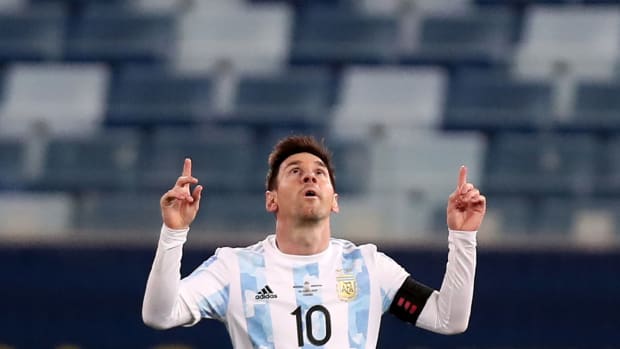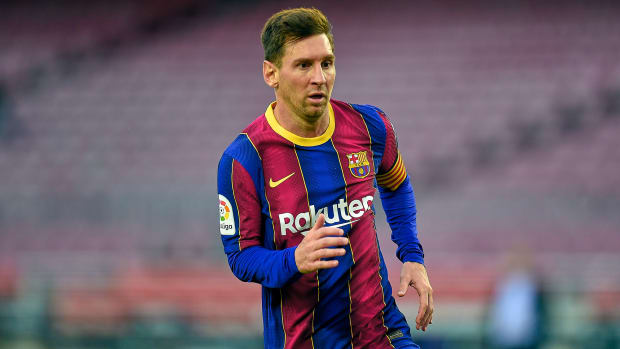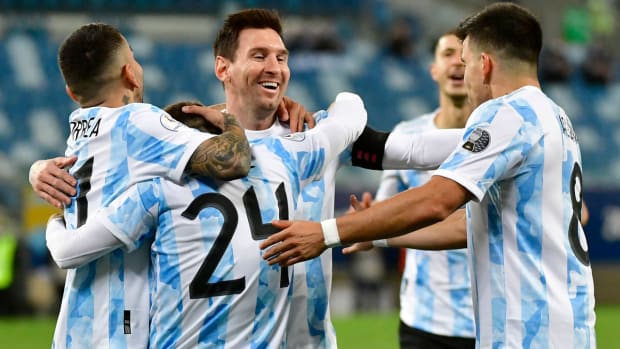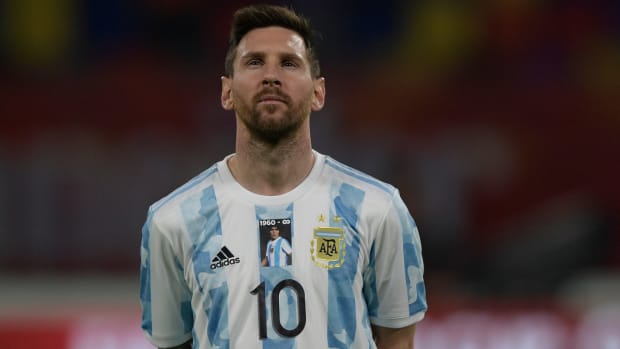Messi appears to have a level of acceptance combined with a spark of ambition as he maintains his quest for Argentina while looking set to stay with Barcelona.
On Monday night in Cuiabá, Brazil, Lionel Messi became the most capped player in the storied, 119-year history of Argentina’s national team. Let his commitment to the cause never be questioned, even if he’s questioned it himself.
A few days after Messi’s 34th birthday, his peerless precision was still plenty evident as well. Bolivia may have been the weakest side at the 2021 Copa América, but Messi has picked apart plenty of good teams too. He had two goals and an assist in Monday’s first-round finale, a 4–1 Argentina win that sealed the top spot in the group and a Saturday quarterfinal matchup with Ecuador. Messi now leads the competition with three goals and two assists overall.
Speaking after the game, Argentina manager Lionel Scaloni said, “I think that in regards to Messi, everything has been said. We are proud to have him and convinced that he will give us more joy.”

Indeed, it’s all been said, written, analyzed, blustered and memed. Everyone knows the facts: Argentina, a two-time world champion, somehow hasn’t won a major title since the 1993 Copa América. That was 28 years and 19 tournaments ago. It’s a barren stretch that includes seven lost finals and which, unfairly, has become inextricably associated with (or blamed on) Messi. Yes, it's a team sport. Yes, international soccer—especially the modern version contested by exhausted all-star squads—can be unpredictable and bizarre (see Euro 2020/1). But surely an athlete of such incomparable skill, a six-time FIFA player of the year backed by a domestic developmental pipeline with championship pedigree, should win at least one significant senior international honor.
Instead, there’s been failure and frustration, bad bounces and federation mismanagement. The nadir was the three consecutive lost finals of 2014-16, when Messi and Argentina were a few inches away from a World Cup and at least one Copa crown, but just missed. The weight of the wait, of those close calls, of the criticism and confusion and self-doubt, was crushing. Moments after missing a penalty in the shootout that decided the 2016 Copa América Centenario in favor of Chile, an overwhelmed Messi claimed he was finished with international football. It had produced too much heartache.
“In the locker room, I thought the national team was over for me. It is not for me,” Messi said at MetLife Stadium. He told reporters, “That's it. This is not for me. We've lost again—another final. I'm not meant to be here.”
Messi seems to be a creature of comfort. He values growth and ambition within the confines of loyalty and stability. He’s talked about how challenging his move from Rosario to Barcelona was as a 13-year-old and since then, his preference has been to establish roots. His flight instinct kicks in only when the soil becomes toxic. That happened with Argentina in 2016 and it happened last year with Barcelona, where a decline in on-field fortune coincided with Messi’s falling out with club president Josep Bartomeu. The infamous burofax was analogous to the mixed-zone meltdown at the Meadowlands.
His comments on Barcelona were similar. They reflected how much he values trajectory, trust and a sense of belonging.
“I believed that the club needed more young players, new players, and I thought my time in Barcelona was over. I felt very sorry because I always said that I wanted to finish my career here,” Messi told Goal last fall.

Time heals, however, and so does new management. Joan Laporta reassumed the Barça presidency in March, the club won the Copa del Rey in April and now it appears Messi is content to sign a new contract. His old one, the one he sought to escape via burofax, ended Wednesday.
Similarly, Argentina has been somewhat refreshed—not improved, necessarily, but refreshed. There’s been turnover at the federation and on the national team. Only eight of the 28 players at the Copa América were on the World Cup roster three years ago. And while Scaloni, a promoted caretaker without much managerial experience, faces significant skepticism about his suitability for the job, those questions haven’t scared off Messi. Argentina also appointed retired midfielder Pablo Aimar, a friend and idol of Messi’s, as an assistant.
This is an odd Copa América. It’s been postponed from last year, moved from Argentina and Colombia to empty arenas in Brazil, and overshadowed globally by the Euro. Two guest teams withdrew, and it’s being staged just two years after an edition that also was played in (and won by) Brazil. If there ever was a time for Messi to say “no, gracias” and mean it, it would be now. His contract situation remains technically unsettled. Argentina’s prospects for a title haven’t exactly improved with so many newer players and Neymar’s Brazil positioned as a heavy favorite. It would’ve been understandable if the thought of a seven-game slog under mitigating circumstances didn’t appeal.
Yet here he is, as present and passionate as ever.

Argentina's 2018 World Cup coach, Jorge Sampaoli, famously wrote, “Messi has a revolver put to his head called the World Cup and if he doesn't win it, he's shot and killed. As a result, he can't enjoy his talent. What I find is that the negativity surrounding international football damages Messi.”
But Messi can’t stay away. That’s ironic, considering the gusto with which so many countrymen have questioned his affinity and commitment. Nor is he genuinely prepared to relinquish his dream of lifting that elusive international trophy.
"I have to stand up and try again, no matter how many times I fall,” he said in 2019. “This is a good message for the kids—not just in football, but in life. I want to retire having won something with Argentina.”
Speaking this month before the Copa kicked off, he said, “I’m always available for the Argentina national team. My biggest dream is to win a championship with this shirt. I was very close a few times. It didn’t happen but I keep trying. I will always fight for this dream.”
It’s easy to imagine that the environment surrounding Argentina might have evolved in recent years. The national team is no longer at its peak and so rational expectations, if those are possible, should be a bit more modest. The pressure to win with this group and at this juncture is just different. There are missed opportunities to lament, sure, but the calculus has changed. Argentina isn’t as strong and Messi isn’t as dominant. Argentina wasn’t close to being a World Cup contender in 2018, it finished third at the 2019 Copa América and it’s a satisfactory but unspectacular 3-0-3 in 2022 World Cup qualifying. A triumph at the Maracanã in the Copa final would be a surprise. Theoretically, that should lower the revolver a little.
There’s also the matter of Diego Maradona, and the relentless and exhausting comparison between the two icons. Messi will not reach Maradona. Napoli named its stadium after Maradona. This week his boyhood club, Argentinos Juniors, unveiled a tribute jersey reading “LA CUNA DE D10S,” or “The Cradle of God.” Similar homages to Messi are unlikely. He will not match the late legend’s mythic standing in the hearts of Argentines, even if he does finally deliver a trophy. Maradona’s November death at age 60 sealed it. He was a falling star, shining brightly and gone too soon, elevated to divine status by his story, his passion, his flaws, the what-was in the summer of 1986 and the what-might-have-beens that followed. The chase is over. Messi should be relieved, and his critics should give it a rest.

“I would have loved to be a world champion, but I don't think I would change anything else I had in my career to have it happen. This is what I was meant to do, what God gave me. It's for a reason,” Messi told Argentina’s TyC two years ago. “What happened is that I’ve lived many things with the Argentina national team and I’ve had to live many things which weren’t fair. But in the end, I tried and I will keep trying.”
His career has been superlative, and his club and individual honors, statistics, durability and consistency comfortably surpass Maradona’s. Messi should be at peace with his path, and perhaps he is. Those comments suggest a certain level of acceptance combined with a lingering spark of ambition. That would explain his return to the national team, especially now, and his recent positivity.
”It’s always special to be with the national team. We want to win. That's the goal,” he told Argentina’s website before the tournament. “I think we have a very united group, with a very good core that has been worked on since Scaloni arrived, with the boys that he's brought in. We've got a very good group and that's the important thing. It's got to be a very strong group for the challenges that await us.”
Scaloni added, “Leo has shown he is well, comfortable, with a new generation that he barely knew. And now he is one of them. He gets along with all. We have managed to make a team in which he can fit.”
If he fits, then bring on those challenges. A win over Ecuador would send Argentina through to a July 6 semifinal in Brasilia against either Uruguay or Colombia. The Copa final is four days later. There are three games separating Argentina from the end of an epic drought, and three games to win if Messi is to close that uncomfortable hole in his résumé. It may not happen. But this summer feels different, regardless of the result. The pressure and scrutiny aren’t the same. Change has come. The end is in sight. Hopefully, for Messi’s sake, maintaining the chase comes with its own sort of satisfaction.
More Soccer Coverage:
No comments:
Post a Comment